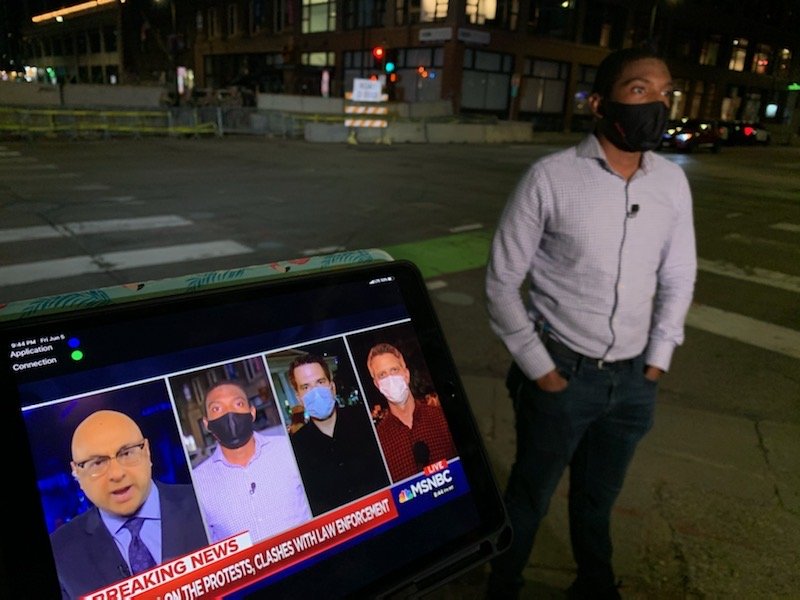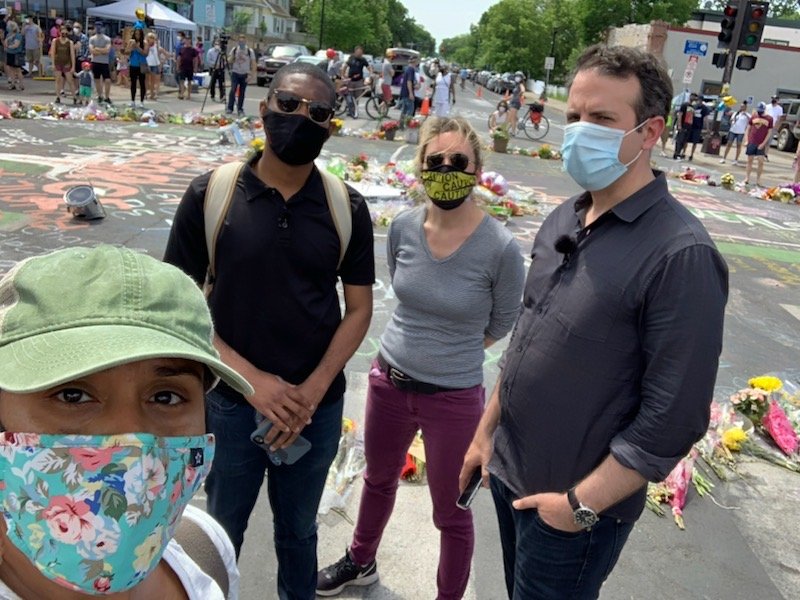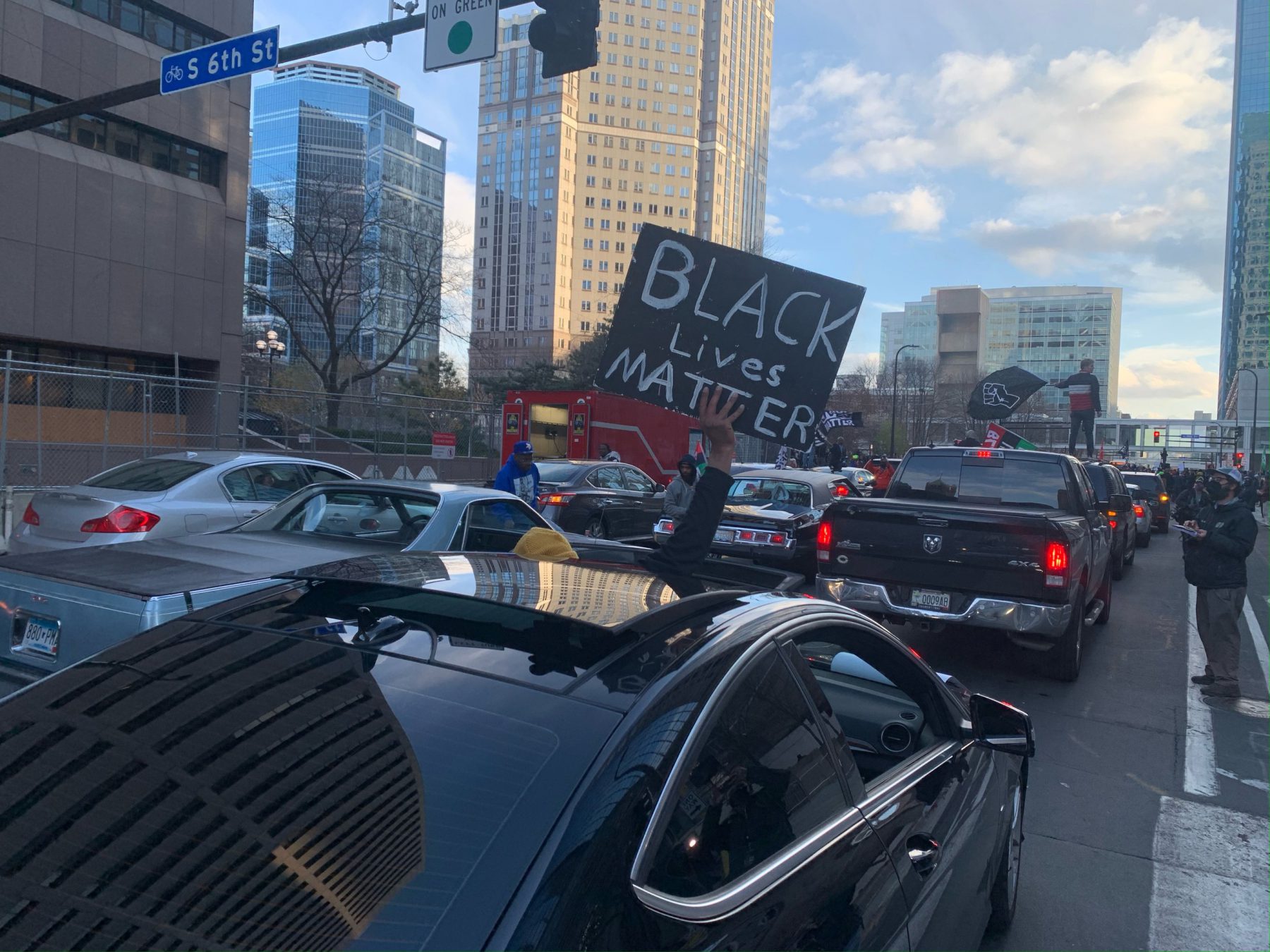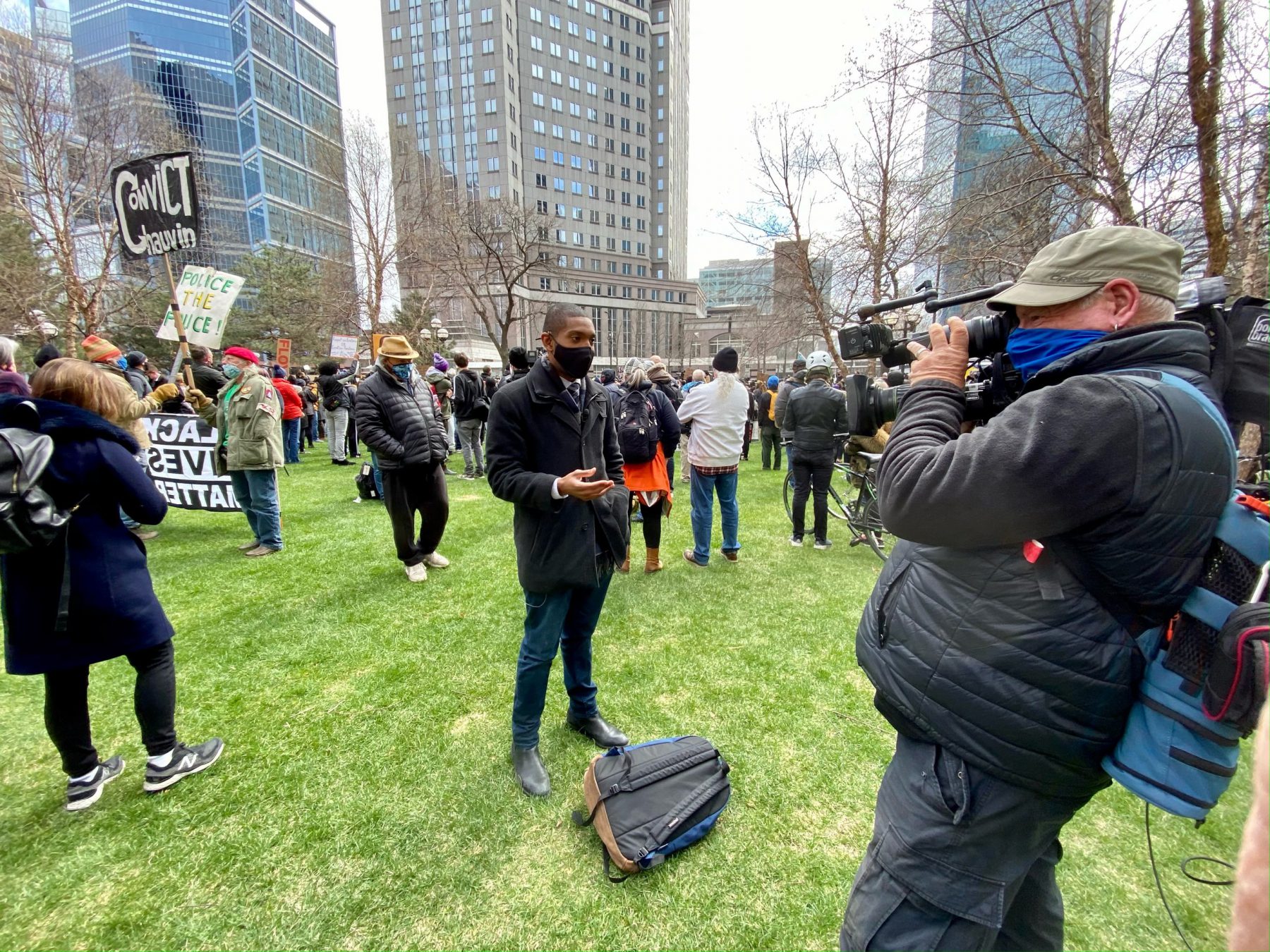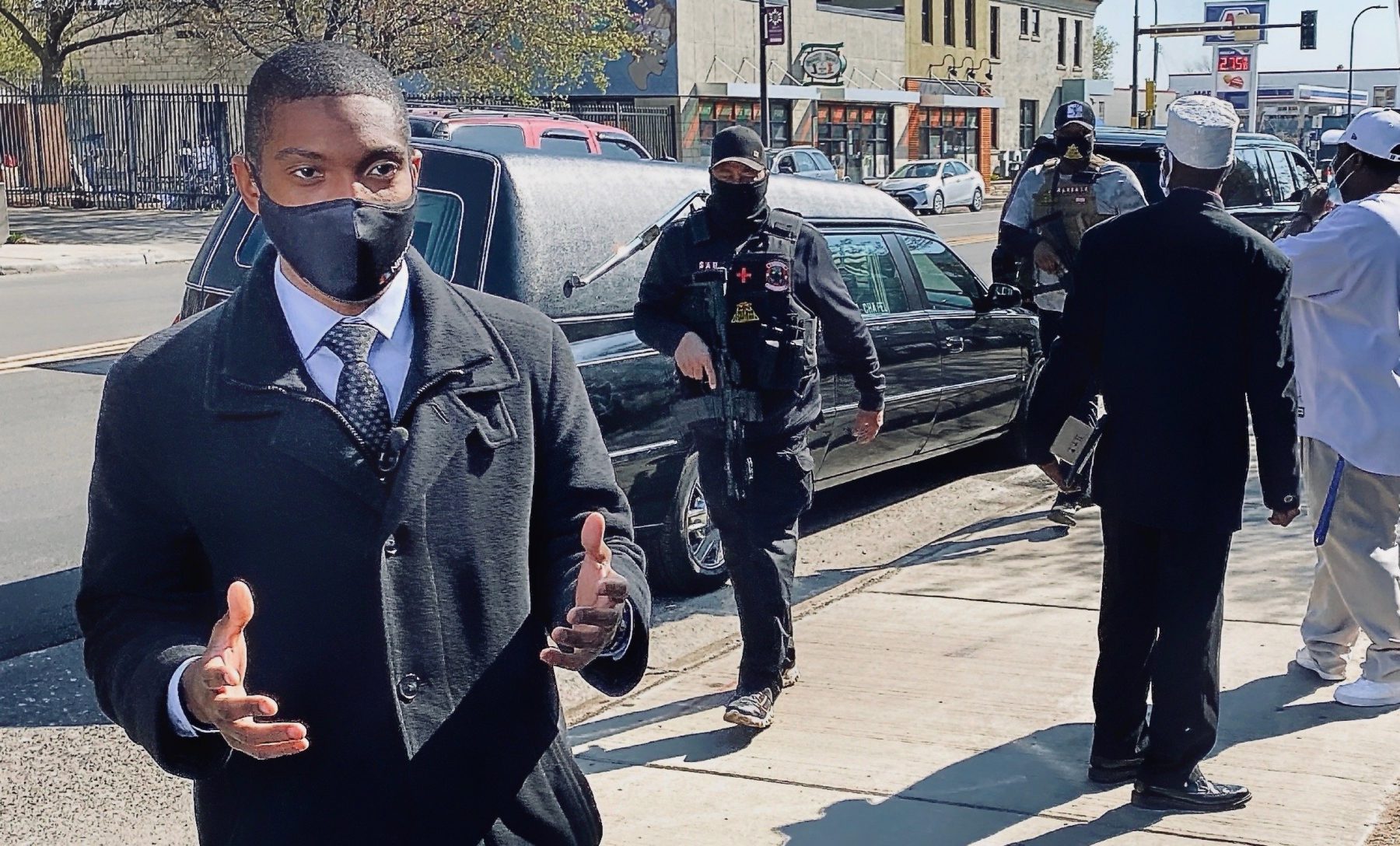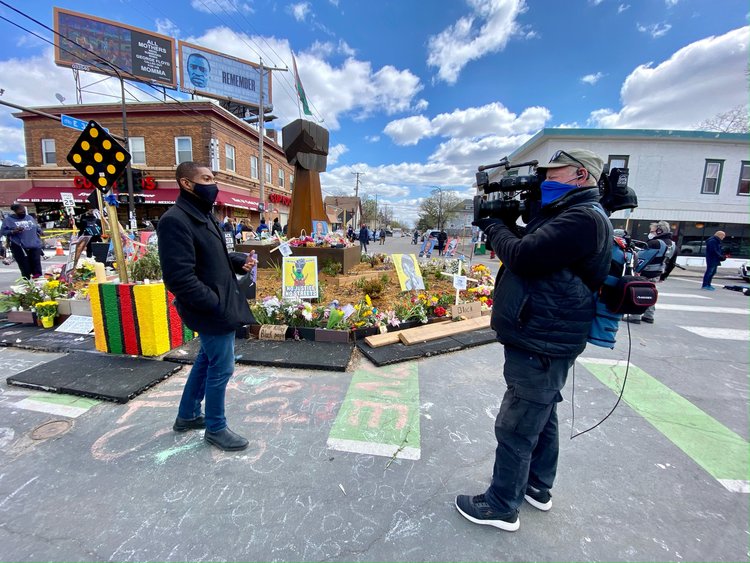
When George Floyd was murdered by police two summers ago, NBC News correspondent Shaquille Brewster knew instantly the story would be big — perhaps bigger than anything else he had ever covered.
As the network’s first journalist deployed to Minneapolis, Brewster worked 12-hour days in the tumultuous days that ensued, at times with no crew or security in tow. He estimated that he shot 115 to 120 live reports in and around George Floyd Square, documenting memorials, protests and violent clashes between demonstrators and police. Then he kept going: flying from city to city over the next months to cover the trials and the reforms that unfolded at local police departments.
Ahead of the second anniversary of Floyd’s death, Brewster spoke with NBCU Academy about his experience reporting the event that ignited a racial reckoning, and shared advice for young Black journalists hoping to follow in his footsteps. The following is a transcript of the discussion, lightly edited for brevity.
Where were you when you heard of George Floyd’s murder? What were some of your first thoughts?
George Floyd was killed on May 25th, which was Memorial Day. In Chicago, it’s always a weekend where you see the highest crime numbers of the year. I was assigned to cover the weekend gun violence. I was up fairly early and saw the video. And I instantly knew my story for the day was going to change. I got up and set up a home camera, and I did the first live shot at 11 a.m. on MSNBC. (This was a couple of months into the beginning of the pandemic, so we weren’t flying all that much and were doing at-home studios.) We didn’t even have Floyd’s name at the time. Then that afternoon I drove 6½ hours to Minneapolis. The first stop was at [what later became known as] George Floyd Square. I didn’t have crew or security with me. I didn’t even think I was supposed to be there but I wanted to talk to folks before I covered it live on air the next day. Later that night we saw the first clash between protesters and police.
As the first NBC News reporter on the ground, how was your experience covering this story and its aftermath?
Those first few days were long hours, a lot of moving parts, a lot of updates to the investigation. On the first day, my first live shot was at 9 a.m., my last was at 11 p.m. The next morning I was right back up. You also had the security element and the rioting at night and the clashes with police. I wasn’t getting a lot of sleep.
I’m so focused on making sure I have the latest conversation, making sure I have all the facts right and working out the logistics that there’s no time to process my immediate reaction to the story. The weight and gravity of it didn’t hit the first few days. In terms of what it all meant—I don’t think there was one specific moment that I can pinpoint to when it happened. I’m most reflective when I’m flying out after doing a story. I was in Minneapolis for around three weeks covering this story. I remember flying out, I just felt this level of exhaustion but also emotional relief because I finally got to think about everything. It was when I realized, “Wow, we saw a lot.”
What kind of danger did you face on camera and on the ground?
There was never any direct attack toward me, but there were definitely some tense moments in Minneapolis. I had a Morning Joe live shot after the police precinct burned down one night. When we were driving into the location at 3 a.m. or 4 a.m., buildings were still on fire, the electricity was out, and there were people randomly in this parking lot. For some reason our security didn’t show up. Our entire crew looked at each other and said, “This is not safe.” So we left. There was another situation when I was live on air and there was a stabbing down the road where a protest was happening.
Gallery: Reporting from Minneapolis
What are some of the most memorable moments you experienced as a journalist?
One moment I’ll remember the feeling forever is when we learned that the first officer was being charged. I was in George Floyd Square and I remember the conversations I had with people live on air. I also remember the day that Floyd’s brother, Terrence, visited his grave. He was in pain and started to collapse at one point as he was walking to the memorial. One of the things he said was, “If I’m not out there burning things down, then what are y’all doing?” I felt there was a shift in the protests that happened after. That was a poignant moment where you had the actual family of Floyd there at the location he was killed.
One moment that stuck with a lot of people became a promo on MSNBC. Minutes after [police officer Derek] Chauvin was found guilty of murder, I was doing live interviews with people in the square outside the courthouse. I spoke to a middle-aged white man who told me that morning he Googled, “How can a white person help Black Lives Matter?” It’s reflective of what you felt in Minneapolis, where nearly every protest is majority white. It’s also reflective of what I saw as a diverse movement that was forming. There was diversity of race, of religion, of ideology. That conversation reflected what I’d seen for nearly a year.
How do you decompress from reporting on this story? What do you do to take care of your mental health?
Almost a week after Floyd died, I was scheduled to officiate a friend’s wedding. In journalism, there are plenty of times when you have to make sacrifices because of breaking news, like missed birthdays and missed family events. I remember thinking at the time that I need to be around friends and I need to be around joy right now. So I left. I had a Meet the Press live report that Sunday morning, and I drove 6½ hours back to Chicago, and I officiated the wedding that afternoon. Then I was on the next flight back to Minneapolis the next morning. That was an example of me realizing that it’s healthy to get away even if it’s just for a few hours. Because of the weight of the story, I was more willing and more insistent on leaving it for that brief time than I would have been under other circumstances.
Over the past couple of years, what did you learn as a professional? Has it changed how you interact with communities or police?
I can’t identify any way in which covering this story specifically changed things for me. You’re always learning and adjusting — that’s the beauty of journalism. This is a hugely consequential story that’s part of the evolution of journalism. One big lesson you saw from George Floyd’s murder was you should apply the same level of skepticism to a “man on the street” or a politician or an expert to narratives you hear from the police. The first statement we got from the police hours after Floyd’s murder talked about how he experienced a medical emergency and never mentioned there was knee on his neck for nine minutes.
Some reporters talked about how frustrating it is to have to defend their ability to report objectively on issues that they have personal stakes in. Did you experience such comments as a Black reporter? How did you deal with them?
The conversation about journalism and objectivity always gets a little simplified. We’re not robots, we’re people. We all have our lived experiences and our own perspectives. We don’t shed that when we’re reporting and telling a story. But it’s your job as a professional journalist to make sure you’re checking your assumptions. I would say journalism is not the absence of bias and independent thought. Journalism is the skill that allows you to put that aside and tell a fair and accurate story with appropriate context. There was never a moment in Minneapolis when people questioned whether I was doing that. I had my facts straight and if I ever got anything wrong, I was quick to correct it.
What kind of advice do you have for young Black reporters who want to go into the social justice or policing beat? How could they prepare for a career in journalism?
The first message is, “We need you.” We need more reporters and more Black male reporters. I always feel there’s a shortage of Black male reporters at a national and local level. In terms of advice, put in the work and be prepared for the grind. Journalism, especially early on, is not the best-paid profession. There are lots of overnight shifts, uncomfortable places you have to go. But it’s also extremely rewarding. Covering Floyd’s murder and people’s stories I was able to share — explaining the Chauvin trial to people, having conversations about reactions to verdicts— that’s some of my most fulfilling work I’ve ever done. Going city to city, police department to police department, and looking at local reforms being implemented — there’s a lot I took away personally from all of that.



